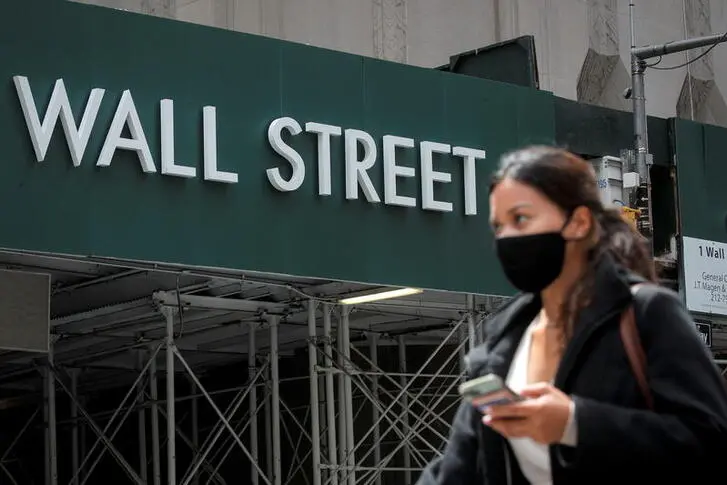PHOTO
WASHINGTON - Wall Street was down and the dollar surged on Friday as investors tried to balance a seemingly more hawkish stance by the Federal Reserve with persistent optimism about the U.S. economy as it emerges from the pandemic.
The blue-chip Dow and benchmark S&P 500 appeared set for their worst day in a month after Wednesday's policy update from the Fed, in which officials projected interest rate hikes sooner than expected as the economy recovered. Stocks had wavered since that update, but took a steeper turn on Friday after Federal Reserve official James Bullard said inflation was stronger than anticipated.
The Dow was down 426.27 points, or 1.26%, the S&P 500 lost 37.79 points, or 0.90%, and the Nasdaq Composite dropped 83.11 points, or 0.59%.
The MSCI world equity index, which tracks shares in 45 nations, fell 6.94 points or 0.97%.
Bullard's remarks came two days after Fed officials projected interest rate hikes as soon as 2023. At this week's meeting, Fed officials vowed to keep up strong monetary support while the economy recovered, while maintaining that they do not see a recent rise in inflation as a long-term economic risk.
The U.S. dollar index, which tracks the greenback against six major currencies, jumped to 92.23, the highest since mid-April. The index is on pace for a weekly gain of about 2%, its best weekly jump in about 14 months.
U.S. 10-year Treasury yields gave back some gains at midday, dipping below 1.5%. Benchmark 10-year notes were last at 1.4583%.
While stocks have dipped on the Fed's latest update, analysts noted there is reason for persistent optimism about the U.S. economy and what it could mean for markets.
"We believe that a few more quarters of above-trend growth should continue to push risk assets higher, despite building headwinds from the Fed’s pivot toward more restrictive policy, inflation, and potentially higher taxes," said Elyse Ausenbaugh, global market strategist for JP Morgan Private Bank. "The simple way to think about all of this is that the Fed is starting to remove support because the economy doesn’t need as much anymore."
QUADRUPLE WITCHING
Investors were also on guard Friday given it is a "quadruple witching day" on Wall Street, when options and futures on stocks and stock indexes expire, which can trigger volatility in markets near the close of trading. In the past, the quarterly simultaneous expiration of U.S. options and futures contracts has spurred record trading volumes as investors and dealers buy and sell derivative contracts and shares to replace expiring positions.
In a note to clients, Goldman Sachs said Friday there are $818 billion of single stock options set to expire, the second- largest amount in history.
Single stock open interest stands at nearly $3 trillion in notional terms, close to the highest level since Jan. 15, according to the report, which was authored by analysts Vishal Vivek and John Marshall and published on Friday morning.
Elsewhere, oil mounted a comeback after a dip earlier in the week, while spot gold remained down around 5% for the week after the Fed dented the yellow metal's safe-haven appeal.
Oil markets reversed early losses in the day to post gains on anticipated limited U.S. oil output growth this year. Brent crude futures rose 44 cents, or 0.6% to $73.52 a barrel, while U.S. West Texas Intermediate crude futures were up 59 cents, or 0.83% to $71.63 a barrel. Both benchmarks were on track for a weekly gain of about 1%.
The dollar's surge has weighed on gold prices, which plunged following the Fed's statement and have yet to mount a comeback. Spot gold prices fell 0.03% to $1,772.85 an ounce, with prices down 5.4% for the week. U.S. gold futures were down 0.14% to $1,772.90 an ounce.
Higher expectations of inflation continued to lift long-dated U.S. Treasury yields. Benchmark 10-year notes yielded 1.5056%.
(Additional reporting by Thyagaraju Adinarayan, Andrew Galbraith and Tom Westbrook; Editing by Alexander Smith, Mark Potter and Dan Grebler) ((Andrew.Galbraith@tr.com; +86 21 2083 0079; Reuters Messaging: andrew.galbraith.thomsonreuters.com@reuters.net ; Twitter: https://twitter.com/apgalbraith))





















